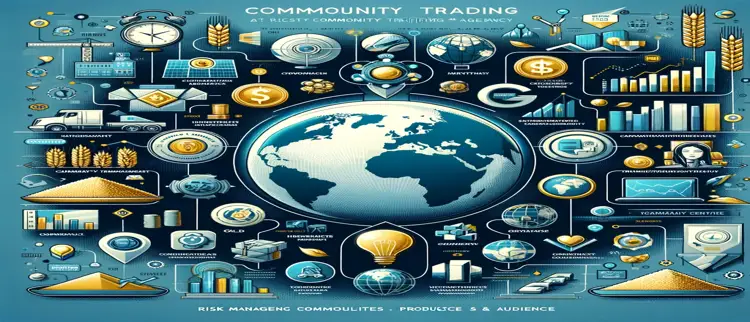As a commodity trading agency, we bridge the gap between market potential and your financial goals. Serving a diverse spectrum of clients within the financial and commodity sectors, we specialize in turning commodity trading into opportunities for growth, risk management, and investment diversification.
Who We Serve:
- Investors: Dive into the vast world of commodities, including precious metals, agricultural products, and energy resources, with strategies tailored to amplify your investment portfolio.
- Commodity Producers: Leverage our risk management solutions and price hedging strategies to protect your operations from market volatility.
- Commodity Traders: Gain an edge in the market with our insights, whether you’re trading on exchanges or over-the-counter (OTC) markets.
- Risk Managers: Secure your company against commodity price risks with our expert strategies, ensuring stability across industries such as agriculture, mining, and energy.
- Commodity Consumers: Achieve price stability for your raw material needs through strategic hedging, enhancing your company’s resilience.
- Research and Analytics Professionals: Access comprehensive analyses on market trends, supply-demand dynamics, and the geopolitical landscape impacting commodity prices.
- Media and Public: Stay informed with our updates on commodity market developments and their broader economic impacts.
- International Trade Partners: Navigate the complexities of global supply chains with our expertise in international commodity trade.
The Fundamentals of Commodity Trading
Commodity trading is an integral part of the global financial markets, providing a critical mechanism for price setting, risk management, and investment opportunities across various sectors. At its core, commodities are basic goods or raw materials used in commerce that are interchangeable with other goods of the same type. These commodities are typically divided into two main types: hard and soft commodities.
What Are Commodities?
Hard commodities are natural resources that must be mined or extracted. They include energy commodities like oil, natural gas, and metals such as gold, silver, and copper. These commodities often serve as indicators of economic health; for instance, oil is closely watched for signs of economic activity levels, and gold is a popular “safe haven” during times of financial uncertainty.
Soft commodities, on the other hand, are agricultural products or livestock, including wheat, corn, soybeans, coffee, sugar, and cattle. The prices of soft commodities can be highly volatile, influenced by factors like weather, disease, and shifts in consumer preferences.
How Commodities Are Traded
Commodities are traded on several exchanges around the world, such as the Chicago Mercantile Exchange (CME), the New York Mercantile Exchange (NYMEX), and the London Metal Exchange (LME), among others. They can be traded in several forms:
- Spot Trading involves buying or selling a commodity for immediate delivery. It is less common for individual investors due to the logistics involved in handling physical goods.
- Futures Contracts: Agreements to buy or sell a specific quantity of a commodity at a predetermined price at a specified time in the future. Futures are the most common way of trading commodities, allowing traders to hedge against price changes or speculate on market movements without handling the physical commodity.
- Options on Futures: These give the holder the right, but not the obligation, to buy or sell a futures contract at a specific price within a certain time frame.
- Exchange-traded funds (ETFs) and Exchange-Traded Notes (ETNs): These financial instruments track the price of a commodity or group of commodities. They enable investors to gain exposure to commodity prices without directly trading futures contracts.
- Stocks: Another way to gain exposure to commodity prices is to invest in companies involved in producing or trading commodities. For example, you could buy shares in mining companies, agricultural companies, or oil and gas producers.
Why Commodity Trading?
Trading commodities can serve several purposes. For producers and consumers of commodities (like farmers and food companies or oil producers and airlines), trading futures can hedge against price fluctuations, providing some predictability in costs and revenues. For investors and speculators, commodities can offer diversification, as their prices are driven by factors different from stock and bond markets. They can also provide a hedge against inflation, as commodity prices often rise when inflation increases.
Risks Involved: Commodity trading involves significant risks, partly due to the high volatility in commodity prices caused by changes in supply and demand, geopolitical events, and natural disasters. Additionally, using leverage (trading with borrowed funds) in futures trading can magnify gains and losses.
In conclusion, commodity trading is crucial in global financial markets, impacting everything from the cost of goods and services to investment portfolios. Understanding the fundamentals of commodity trading can offer valuable insights and opportunities in the financial world, whether for hedging, speculation, or investment diversification.
The Future of Commodity Trading with Finsurance
As we look ahead, the commodity trading landscape is being reshaped by sustainable energy initiatives, technological innovations in agriculture, fluctuations in the precious metals market, and the digital revolution through cryptocurrencies. The COVID-19 pandemic has further highlighted the need for supply chain resilience, pushing industries towards more diversified and localized sourcing strategies.
Join us at Finsurance as we navigate these evolving trends, offering our clients the insights and strategies needed to survive and thrive in the future of commodity trading. Our commitment to innovation, sustainability, and resilience ensures that we remain your trusted partner in the dynamic world of commodities.
Explore with Finsurance — Where your financial journey meets our expertise.


